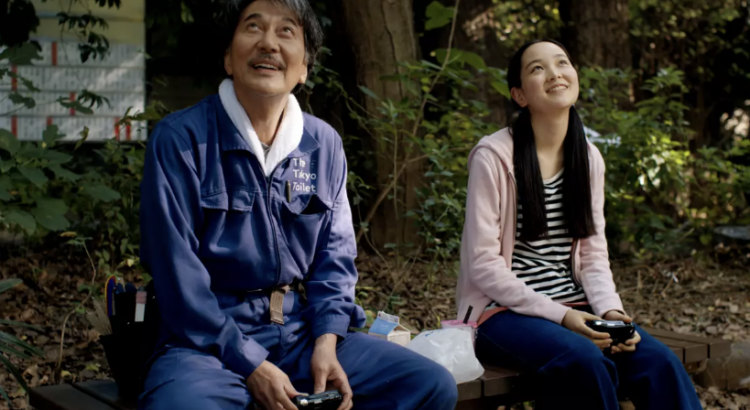I walked into the screening of Wim Wenders’ Perfect Days expecting an idyllic film, something easy to pass my evening time. I hadn’t expected to leave the theater, with the girl sitting next to me sobbing profusely, unable to stand.
The movie follows the daily routines of Hirayama (Kôji Yakusho), a toilet cleaner in Tokyo. He wakes before light, tends to his plants, drinks his morning coffee from the vending machine, and drives off to begin work at his first public bathroom. We listen to his cassette tapes, featuring the likes of The Velvet Underground, The Animals, Sachiko Kanenobu, Nina Simone, and of course, Lou Reed’s Perfect Day. He eats his sandwich on his lunch break, staring up at the sunlight peeking through the canopy, and snaps a shot on his film camera. Before bed, he reads his current book he picks up from the same bookstore he visits from the time before. I was enthralled by the pure simplicity of these scenes. A gentle, yet profound storytelling, executed beautifully by Yakusho.
I was there with him, feeling the anxieties, shyness, frustrations as he moved about his day. There is drama, but it never feels excessive. I had talked about the movie with friends afterwards, and the main thing I felt, I think, was hope. A hope for some sense of contentment in the solitude of Hirayama’s life, a peace in the bustling city of Tokyo, an earnest appreciation for nature. All the quiet moments and details we may have missed, constructed this hope within me. Hirayama barely spoke throughout, and yet he touched my heart so dearly.
The ending scene, which I won’t spoil for those of you who haven’t watched it yet, had devastated me. It was a hollowness that I wasn’t expecting to feel when I read the synopsis (and I’m sure the person sitting next to me didn’t expect it either). What I had initially felt as somehow romantic is actually so deeply rooted in our reality. The movie is so human, in its simplicity, beauty, and loneliness. The same joy derived from routine, the little moments, and even from old habits, can be the same ones that break us down. And yet, we keep moving forward.
I’ll definitely be going back in to watch this movie again. I can’t help that it became one of my favorite films of the last year, even if it sends me into a mild existential crisis.
124 minutes. Rated PG for drinking, smoking, partial nudity. Original language in Japanese, with subtitles. In theaters now.
Image thanks to The Los Angeles Times.


